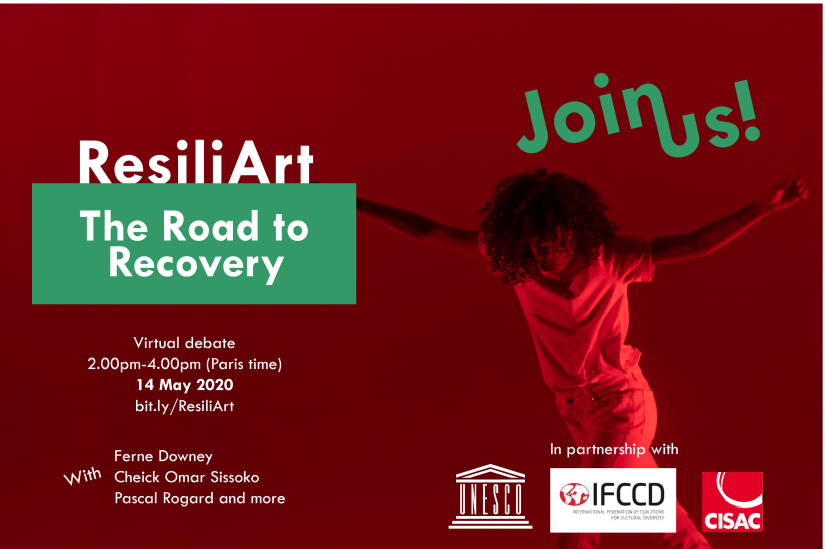
UNESCO held the second ResiliArt debate in partnership with the International Federation of Coalitions for Cultural Diversity on May 14, from 2 to 4 p.m. (Paris time).
The containment measures related to the COVID-19 pandemic have severely affected the creative sectors, limiting the capacity to create, produce and distribute cultural expressions worldwide. The deconfinement phase will allow a gradual resumption of activities compatible with the physical distancing measures. Artists, cultural professionals, cultural institutions, small and medium-sized enterprises, associations, organizations and governments must reflect on the revival of the sector in a context where the VIDOC-19 pandemic remains a major threat to human health. The cultural activities that can be resumed will be subject to constraints that will have significant human and financial impacts. Some activities will only be able to resume in the very long term, particularly those that depend on international mobility. The situation therefore requires a higher level of public support than usual, as well as a review of business models, in order to maintain diverse, sustainable and dynamic cultural ecosystems.
The recovery of the cultural sector faces major challenges globally, such as:
- Inequalities between countries are likely to be exacerbated by the crisis. Developing countries are calling for international cultural cooperation, already fragile and tenuous before the pandemic, to address the situation, in a context where efforts are mainly concentrated at the national level.
- Domestically, the situation threatens the weakest links in the cultural ecosystem. There is a significant risk of increased inequalities affecting women, indigenous peoples and persons belonging to minorities in particular.
- While the transition to the digital environment is accelerating, cultural policies are often not adapted to deal with rapid technological developments. Large multinational companies are monopolizing markets without contributing to the cultural ecosystems in terms of funding, discoverability or copyright protection.
- The already significant digital divide between countries and regions could become even more pronounced at a time when the world is facing a pressing need for innovation. While the crisis precipitates the transition to the digital environment, the development of necessary systems and platforms requires scientific, technical and economic resources that are inequitably distributed.
ResiliArt
UNESCO launched the ResiliArt movement in April 2020 and organized a first debate on April 15 with CISAC. The second debate took place on May 14 and UNESCO choose to partner with the IFCCD, which was proud to co-present the event.
ResiliArt is a global movement that consists of a series of virtual debates with key industry professionals and artists—both renown and emerging—that raises awareness of the far-reaching impact of the current containment measures on the cultural sector. It aims to support Member States in the development of policies and financial mechanisms that can help individuals and creative communities overcome the crisis.
This ResiliArt debate was structured around four key themes:
- The constraints faced by cultural professionals, creators and artists in resuming their activities and the measures put in place to support them;
- The adoption of measures and policies to support and promote the diversity of cultural expressions, particularly in the digital environment;
- New international relations and modalities of cultural cooperation;
- The sustainability of new forms of creation and of the expression of cultural diversity.
Participants
The debate was moderated by UNESCO Assistant Director-General for Culture, Ernesto Ottone. Participants, representing different geographical regions and artistic disciplines, included:
- Anitta, Singer, songwriter and actress (Brazil)
- Ferne Downey, Actress and President of the International Federation of Actors (Canada)
- Cheick Oumar Sissoko, Film director and Secretary-General of the Pan-African Federation of Filmmakers (Mali)
- Pascal Rogard, Director General of the Society of Dramatic Authors and Composers (France)
- Fouzia Saeed, Director General of the National Arts Council of Pakistan (Pakistan)
- Mohamed Saif Al-Afkham, President of the International Theatre Institute (United Arab Emirates)
- Jana Vozarova, CEO of LITA, Society of authors (Slovakia)
Cultural Diversity and COVID-19: The Road to Recovery
Online